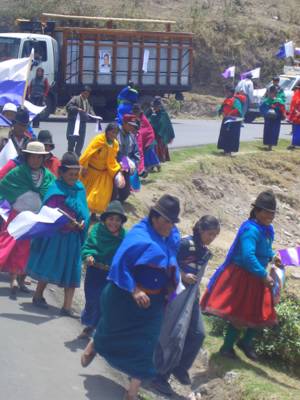

At first I thought this was a quaint, rather old-fashioned way to run a campaign. As it turns out, most campaigning used to take place via television. But several years back, a wealthy candidate bought so much TV time that new laws were passed. There are now limits on how much a candidate can spend on television advertising and various campaign activities. Since it is quite hard to keep tabs on the costs associated with vehicles and their megaphones, it has become a popular political tool.
In some of the rural areas, there are large gatherings of indigenous people supporting particular political candidates. This is even more colorful.



In Cuenca, as I understand it, after Wednesday, the campaigns must take a rest. Let the people consider the choices before the final vote. No more blaring megaphones and honking horns. I’ll believe it, when I don’t hear it..
Additionally, there are blue laws associated with voting. For three days prior to the elections no alcoholic beverages may be sold or served. As I understand it, if you are caught within the three day period, they may jail you, and then you even can’t vote because you are in jail.
And not voting is a big problem. Voting is mandatory in Ecuador. If you don’t vote, you don’t get a certificate, without which you can’t leave the country, get married, get a driver’s license, etc. You can then buy the certificate, but it is pricey. Last year it cost about $8, but this year it was raised to $140.

No comments:
Post a Comment